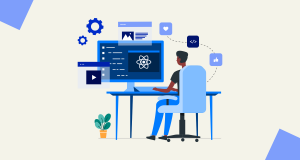Cybersecurity is a big challenge for small and medium-sized businesses. We have developed a comprehensive strategy to protect their information and data, incorporating vulnerability mitigation and increased employee cybersecurity training.

Identify gaps in strategy
The first step in ensuring your business’s cybersecurity strategy is to identify security vulnerabilities. How can you overcome your weaknesses if you don’t know them? Start by identifying the most important pieces of data in your business. It could be intellectual property, customer information, or financial information. Be vigilant when mapping your data collection, storage, and processing processes, and consider transit points where data could be leaked or stolen. Assess the consequences of a breach for your business, employees, and partners, then put preventative measures in place.
Protect computers and devices
Computers and other devices are portals to all the business that is done. However, because these devices are connected to the Internet and local networks, they can easily be attacked. These are our guidelines for enhancing the security of your entire company’s computer systems.
A. Software update
The most important (and perhaps also the simplest) step to protect your system from attacks is to ensure that you always use the latest software version. Hackers often look for vulnerabilities in popular software to take advantage of and penetrate the system. They may do this to make money, promote political causes, or simply because they can. This intrusion can cause major damage to your business operations, from stealing customers’ personal information to passwords on your computer.
Software manufacturers like Microsoft are always looking for and patching bugs in their products. When they detect errors, they release updates for users to install. You must install updates as soon as they are released. This helps prevent attacks such as WannaCry, a global attack in 2017 that affected large organizations such as FedEx and the UK Public Health System. Before this attack, Microsoft released a patch, but many systems were not updated, leading to this attack. Always pay attention to updating the software you use to avoid falling victim to similar attacks.
Instruct:
- If you have a system administrator, make sure they stay informed about new software updates and update them regularly.
- If you own a small business and manage your computer systems, simply enable Windows operating system updates. Don’t forget to restart your computer after completing the update.
B. Protection against viruses

Viruses are malicious programs that can enter your computer without any warning. They can affect many aspects, including accessing, deleting, or changing files. Once your computer is infected with viruses, they can spread quickly throughout your network, causing data loss and security risks.
Malware and spyware are the two most common viruses today. Malware are programs with malicious behavior, often fraudulently downloaded and gaining access to the victim’s computer. Spyware is a type of malware that locks your computer and demands a ransom to unlock the encrypted files.
To prevent your computer from being infected with viruses, install antivirus software and regularly update it to protect against new viruses. Also, be wary of opening files or emails from untrusted sources. Using a VPN when accessing the internet can also increase security by anonymizing and encrypting data.
If you become a victim of spyware, there are step-by-step instructions to help you effectively handle a situation that negatively impacts your protection strategy.
Instruct:
- Update and use anti-virus software or install it if you don’t have it.
- Remind employees not to open suspicious attachments.
- Use a VPN when accessing the Internet.
- Learn more about how to handle spyware attacks in case you need it.
C. Set up a firewall

Like most businesses today, all the devices in your office have broadband internet capability. This means that your computer network has probably been tested by hackers at least once. Hackers often do this randomly, but when they discover a valid computer address, they will exploit any vulnerabilities to gain access to your network and the individual computers within it.
Installing a firewall is the best way to prevent these attacks. Firewalls work by separating different parts of the network, allowing only authorized traffic to pass through the protected part. If you’re a small business owner, your firewall blocks your local network from the wider Internet. A good firewall will inspect each data packet that enters your network to ensure it is legitimate and eliminate suspicious data packets. To prevent hackers from invading personal computers on your network, a firewall will hide the individual identities of each of these computers, building an optimal network security strategy.
Firewall installation is often complex and should only be performed by trained professionals. This helps make your job easier: you just need to contact your system administrator and make sure your network is protected.
Instruct:
- Contact your system administrator to confirm whether your local network has a firewall set up. If not, ask them to set it up.
D. Special precautions for laptops and other mobile devices
For laptops and other mobile devices, data protection is extremely important. Ensure that anti-virus software and operating systems are always up to date on these devices. Develop specific regulations on device use in the workplace and require security features required on each device. Finally, it’s a good idea to contact cloud service providers to find out what security solutions are right for you and how they can help.
Instruct:
- Update your company laptops and phones with the latest operating system and anti-virus software.
- Establish rules for device use in the workplace and require security features.
- Contact your cloud service provider.
Protect your data

No matter your business, your data is at the core. Without customer contact information, data on inventory, assets, and more, you won’t be able to operate as a business. Your data can be lost in many different ways. Your hardware could be damaged or broken, hackers could get into your system and steal data, or a natural disaster could hit you. Therefore, your goal should be to prevent the possibility of data loss by guarding against its worst effects.
A. To protect your data, there are several measures to take:
Back up important data: Make sure to perform regular backups and evaluate your backup system to ensure it is working effectively.
- Encrypt data in the cloud: Consider encrypting sensitive data before storing it in the cloud and choose a service provider with the appropriate level of security.
- Password protection: Require employees to use highly complex passwords and change them regularly. Use two-step verification for added security.
- Set up access rights: Limit access to the system by providing separate accounts with specific permissions for each employee and revoking access rights when necessary.
B. Encrypt your network connection with a VPN
Using a VPN service to protect your network connection is a fairly effective way to ensure privacy and security for your business and your employees. VPN not only hides the company’s IP address but also encrypts network access data. This helps anonymize your browsing and protect your data from online threats.
Although there are some free web proxy services, they do not guarantee security or privacy. Paid VPN services often offer more security and reliability features. Although there is a monthly fee, it is a safe and worthwhile investment for business security.
Consider signing up for a professional VPN service, especially for businesses. You should also encourage employees to use a VPN when connecting to the company network remotely to ensure the security of sensitive company data and information.
C. Manage sensitive data remotely
If your company has employees working remotely, especially when they access sensitive company data, you need to ensure that their connection is safe and secure. Using a mobile device management solution can help you control and protect data when employees work remotely.
Work with your IT staff to establish safe and secure connections for remote workers. Using a dedicated VPN service can be a good option to help employees access the office network securely.
Protect customer information
Protecting customer data is an important priority for every business. Ensuring that sensitive customer information is secure is an integral part of your security strategy.
- If you run an e-commerce site or process online payments, make sure your site uses an SSL certificate and the HTTPS protocol to encrypt the information transmitted. This helps protect your business’s customer data as it travels from their web browser to your server.
- If you handle customer data within your company, apply all necessary security measures, especially those related to data storage and transfer in cloud or intranet environments. company ministry.
Establish a Workplace Cybersecurity Strategy

Establishing a workplace cybersecurity strategy is an important part of ensuring the safety and security of your business. Here are some specific instructions for you to follow:
- Employee training: Employee training on the importance of cybersecurity is paramount. Explain the security policies and measures the company has in place, and educate them on how to implement security measures in their daily work.
- Motivate employees: Design cybersecurity plans that employees can participate in and feel like they are an important part of the process. Encourage them to share their opinions and suggestions on how to improve cybersecurity.
- Hold regular training sessions: Hold regular cybersecurity training sessions to update employees on new threats and how to avoid them. Make sure their passwords and access permissions are up to date and that they are trained to recognize and prevent attacks.
- Develop cybersecurity policies and guidelines: Set clear cybersecurity policies and guidelines and require employees to comply. Make sure each employee understands and signs these policies, and can refer to them as needed.
- Continuous updates: Keep employees up to date on changes in cybersecurity measures and new threats. Make sure they are informed and have enough knowledge to deal with these changes.
By implementing these guidelines, you can build a strong cybersecurity strategy and help protect your business from online threats.
Conclude
Establishing a cybersecurity strategy is extremely important to protect a business’s data and information systems. By adopting security measures and employee training, we can create a safe and trustworthy work environment. Remember to always update and improve your knowledge of network security with Tinasoft to ensure business safety in today’s digital age.













